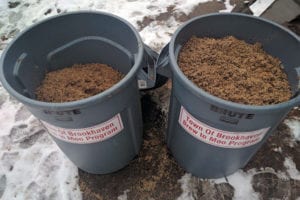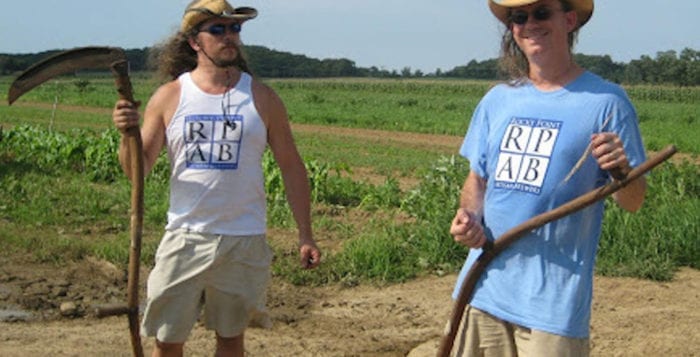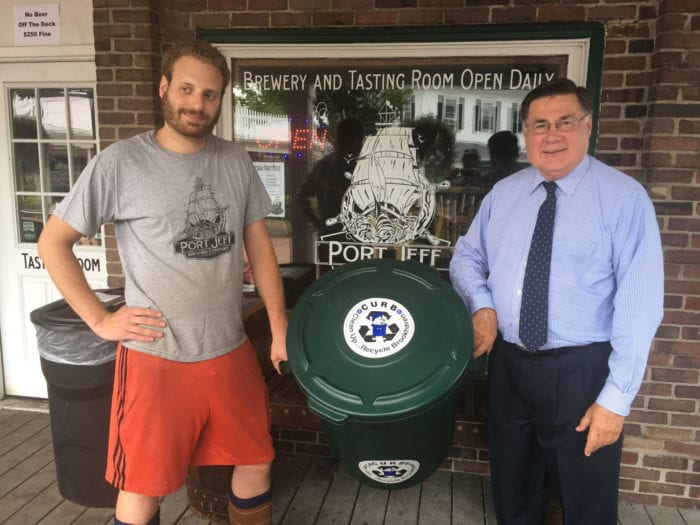Rescue animals at Double D Bar Ranch can thank Rocky Point Artisan Brewers for their full bellies.
The brewery has entered into a partnership with Town of Brookhaven, called Brew to Moo, in which spent grains are sent to feed abused or unwanted farm animals at the Manorville ranch.
“I think the program is wonderful,” said 51-year-old Mike Voigt, the owner of Rocky Point Artisan Brewers, which he founded in 2008 with Donavan Hall. “I’d like to get involved and actually go see the animals. It’s terrible to throw out the grains, so to see it get put to good use is fulfilling.”

A byproduct of brewing is literally tons of spent grains left behind from hops, barley, oats or whatever is used to make the beer, which in many cases gets tossed in the trash. While the grains have reduced caloric content, they can provide protein and fiber that can supplement corn for livestock feed.
Voigt, who said he’s typically handed over his grains to friends whenever needed, heard about the program through Port Jeff Brewing Company, and reached out to the town to get involved. Rocky Point Artisan Brewers is now the third local brewery or distillery to link with the town in its efforts to reduce, reuse and recycle, along with the Port Jeff brewery and BrickHouse Brewery in Patchogue, which was the first to get involved. Town of Brookhaven Supervisor Ed Romaine (R) said he expects Patchogue’s Blue Point Brewing Company to get involved as the fourth partner once the organization has moved into its new
headquarters on Main Street at what was formerly Briarcliffe College.
“Breweries spend a lot of money getting rid of the leftover grains, because it is now garbage, but we’re in the interest of looking for ways that we can reduce our waste, recycle it, and reuse that which we recycle,” Romaine said. “We’re picking up the spent grains that breweries would typically have to pay a carter to take away, and then we’re taking that spent grain to farms to feed the animals. It’s a way to continue to promote reusing and recycling. We shouldn’t be a throw away society.”
Since the program launched in August 2017, approximately 50 tons of spent grains have been fed to the rescue animals at Double D Bar Ranch on Wading River Road.
“Breweries spend a lot of money getting rid of the leftover grains, because it is now garbage, but we’re in the interest of looking for ways that we can reduce our waste, recycle it, and reuse that which we recycle.”
— Ed Romaine
Rich Devoe, the operator of the ranch, which is a nonprofit organization, said the roughly 400 animals living at the ranch never go hungry, but having a steady source of food from the two breweries will allow him to substantially shrink the food bill. Typically, he spends $175,000 a year on feed. Now, Devoe will be able to save $100,000 of that, and spend its donations and money from his own pocket elsewhere, like on barn repairs and fencing. He called the arrangement “great” and “very important.”
“We’ve even had breweries from outside of the town calling us asking to get involved that we’ve had to turn away,” Romaine said. “Seeing what owners like Mike Voigt are doing is tremendous. This is a model that responsible business will want to enter into with the town.”
Voigt has made good use of the brewery’s spent grains since before Brew to Moo came about. The owner provided more than 1.8 tons to Hamlet Organic Garden in Brookhaven to be composted.
The 21-year Rocky Point resident has been a seller at the Rocky Point Farmer’s Market since its inception in 2012, which is where he met Sean Pilger, a manager at the garden since 2006. Voigt sells most of his beer at the farmer’s market because he said he wants to maintain a local feel.
“The beer doesn’t leave Long Island,” he said. “I like to sell it locally.”
Romaine said he sees the new partnership as enhancing nature rather than disrupting it. Voigt said he is hoping other businesses can continue to get behind that mantra.
“Who wants to throw it out?” he said of the spent grains. “I’m rather small, but seeing this go anywhere instead of in the garbage is a good thing. It takes no more effort to put it in a can and have the town pick it up than it takes to throw it out. I wish the program was larger — it would make sense — and I hope more breweries on the Island get involved.”






